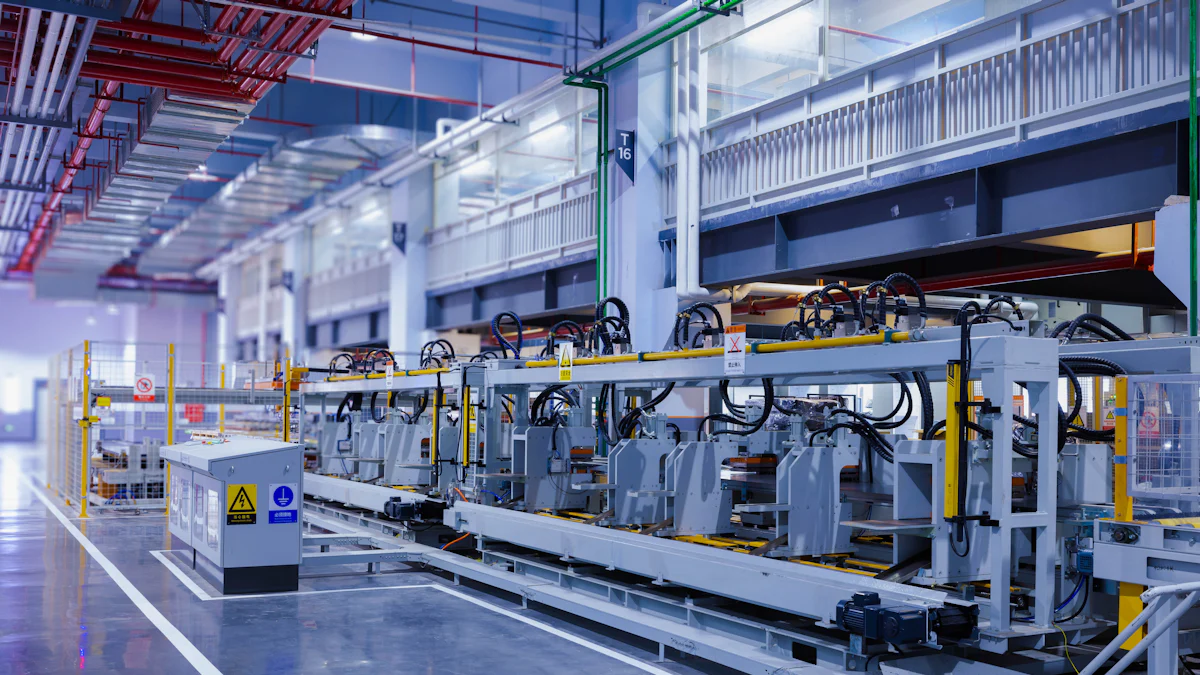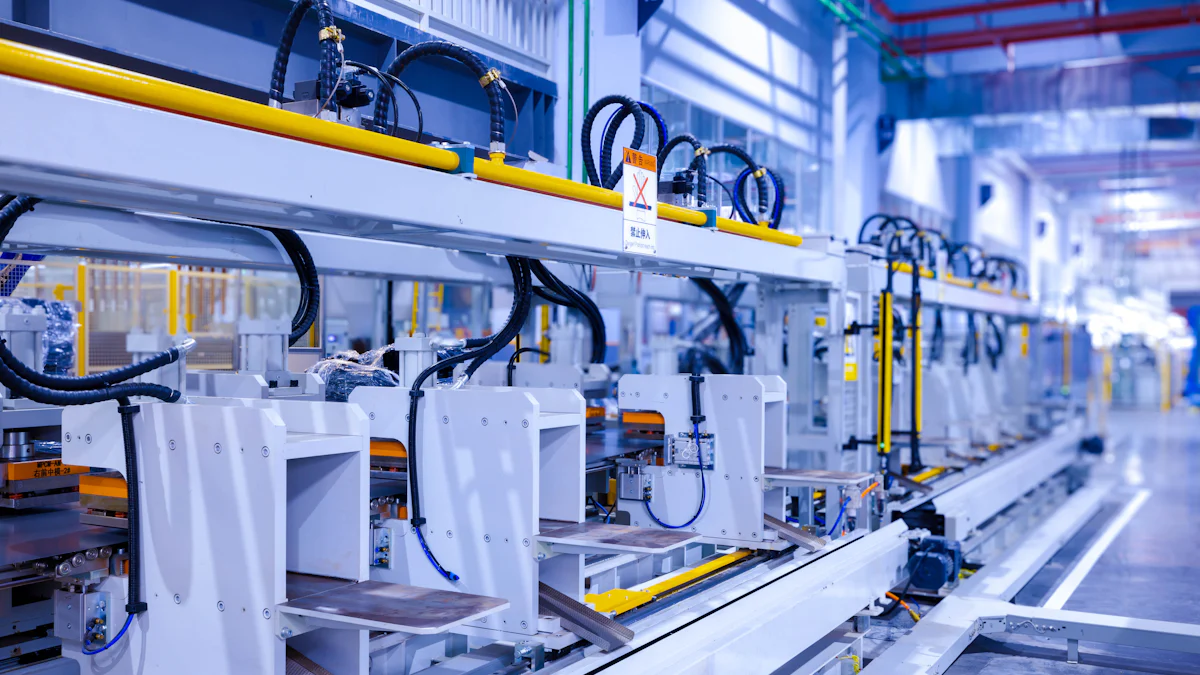Strategic Adoption of Intelligent Systems in Manufacturing Supply Chains in the Digital Economy

Intelligent systems play a crucial role in modern manufacturing. AI technologies, including machine learning and deep learning, transform manufacturing by providing advanced analytics and decision-making capabilities. In the digital economy, manufacturers can track shipments in real time, predict demand fluctuations, and maintain stable inventory levels. Embracing digital transformation within the supply chain can result in significant cost reductions. Manufacturers must strategically adopt advanced technologies to enhance efficiency, productivity, and competitiveness.
Understanding Intelligent Systems
Definition and Components
Artificial Intelligence (AI)
Artificial Intelligence (AI) refers to the ability of computers to emulate human thought and perform tasks in real-world environments. AI systems use logic and decision trees to learn, reason, and self-correct. AI mimics human decision-making, allowing machines to simulate human intelligence to solve problems. In manufacturing, AI technologies provide advanced analytics and decision-making capabilities.
Internet of Things (IoT)
The Internet of Things (IoT) connects physical devices to the internet, enabling them to collect and exchange data. IoT devices include sensors, actuators, and other smart devices that monitor and control manufacturing processes. IoT enhances real-time monitoring and automation in manufacturing supply chains. This connectivity allows for seamless communication between machines and systems, improving overall efficiency.
Machine Learning
Machine Learning (ML) is a subset of AI that enables systems to identify patterns, make decisions, and improve through experience and data. ML algorithms play a crucial role in predictive maintenance and quality assurance in manufacturing. By analyzing large datasets, ML can predict equipment failures and optimize production processes. ML supports autonomous control and process optimization in smart manufacturing.
Benefits of Intelligent Systems
Efficiency and Productivity
Intelligent systems significantly enhance efficiency and productivity in manufacturing. AI-driven predictive maintenance minimizes unplanned downtime. IoT devices enable real-time monitoring of production lines, ensuring smooth operations. Machine learning algorithms optimize production schedules and resource allocation. These technologies streamline processes, reducing manual intervention and errors.
Cost Reduction
Implementing intelligent systems leads to substantial cost reductions. Predictive maintenance reduces repair costs by addressing issues before they escalate. Real-time monitoring helps identify inefficiencies and wastage, allowing for corrective actions. Automation of repetitive tasks decreases labor costs and increases throughput. Overall, intelligent systems contribute to more cost-effective manufacturing operations.
Enhanced Decision-Making
Intelligent systems provide valuable insights for enhanced decision-making. AI analyzes vast amounts of data to identify trends and patterns. IoT devices collect real-time data from various points in the supply chain. Machine learning models predict future outcomes based on historical data. These insights enable manufacturers to make informed decisions, improving strategic planning and operational efficiency.
The Role of Intelligent Systems in Manufacturing Supply Chains

Streamlining Operations
Automation of Processes
Intelligent systems automate various manufacturing processes. AI-driven robots handle repetitive tasks with precision. Automated guided vehicles (AGVs) transport materials within factories. This automation reduces human error and increases productivity. Companies like BMW use AI to automate assembly lines, enhancing efficiency.
Real-time Monitoring
Real-time monitoring ensures smooth operations in manufacturing. IoT devices collect data from machines and production lines. This data provides insights into equipment performance and production status. Manufacturers can quickly address issues, minimizing downtime. Siemens employs IoT for real-time monitoring, optimizing their production processes.
Improving Supply Chain Visibility
Data Analytics
Data analytics enhances supply chain visibility. AI analyzes vast amounts of data from various sources. This analysis identifies trends and patterns, providing valuable insights. Manufacturers use these insights to make informed decisions. GE uses data analytics to improve supply chain management, ensuring timely deliveries and reducing costs.
Predictive Maintenance
Predictive maintenance prevents equipment failures. Machine learning algorithms analyze historical data to predict future issues. This proactive approach reduces unplanned downtime and repair costs. HP utilizes predictive maintenance to maintain their machinery, ensuring continuous production and reducing maintenance expenses.
Enhancing Collaboration
Supplier Integration
Supplier integration improves collaboration in supply chains. Intelligent systems connect manufacturers with suppliers in real-time. This connectivity ensures seamless communication and coordination. Manufacturers can track shipments and manage inventory effectively. JUSDA's JusLink platform integrates suppliers, enhancing supply chain efficiency and visibility.
Customer Relationship Management
Customer relationship management (CRM) benefits from intelligent systems. AI analyzes customer data to understand preferences and behaviors. This analysis helps manufacturers tailor products and services to meet customer needs. JUSDA uses CRM tools to enhance customer satisfaction and loyalty, driving business growth.
Incorporating intelligent systems into manufacturing supply chains transforms operations, visibility, and collaboration. These technologies enable manufacturers to optimize processes, reduce costs, and enhance decision-making, ensuring competitiveness in the digital economy.
Strategic Adoption in the Digital Economy
Assessing Readiness
Technological Infrastructure
Manufacturers must evaluate their technological infrastructure before adopting intelligent systems. A robust infrastructure supports the seamless integration of AI, IoT, and machine learning technologies. Companies need high-speed internet, reliable cloud services, and secure data storage solutions. An assessment ensures that the existing infrastructure can handle the demands of advanced technologies.
Workforce Skills
A skilled workforce is crucial for the successful adoption of intelligent systems. Employees need training in AI, IoT, and machine learning to operate and maintain these technologies. Companies should invest in continuous education programs to keep the workforce updated with the latest advancements. A survey revealed that 36% of respondents had fully or partly implemented AI solutions, highlighting the importance of workforce readiness.
Implementation Strategies
Pilot Programs
Pilot programs allow companies to test intelligent systems on a small scale before full implementation. These programs help identify potential issues and assess the effectiveness of the technology. Companies can gather valuable data and feedback during the pilot phase. This approach minimizes risks and ensures a smoother transition to full-scale adoption.
Scaling Up
After successful pilot programs, companies can scale up the implementation of intelligent systems. A phased approach ensures that the technology integrates seamlessly into existing operations. Companies should monitor the performance of the systems and make necessary adjustments. Scaling up requires careful planning and resource allocation to achieve optimal results.
Overcoming Challenges
Cybersecurity Concerns
Cybersecurity is a significant concern when adopting intelligent systems. Companies must implement robust security measures to protect sensitive data. Regular security audits and updates are essential to prevent cyber threats. A secure environment ensures the safe operation of AI, IoT, and machine learning technologies.
Change Management
Change management is critical for the successful adoption of intelligent systems. Employees may resist new technologies due to fear of job loss or unfamiliarity. Companies should communicate the benefits of intelligent systems and involve employees in the adoption process. Training programs and support systems can help ease the transition and ensure employee buy-in.
Case Studies and Examples

Successful Implementations
JUSDA's Comprehensive End-to-End Solutions
JUSDA Supply Chain Management International Co., Ltd. showcases a successful implementation of intelligent systems. The company integrates raw material procurement, manufacturing, and distribution. This end-to-end solution ensures seamless service from the factory to the end consumer. JUSDA leverages advanced technologies like big data, IoT, and cloud platforms. These technologies enable JUSDA to meet complex and variable customer demands efficiently.
JUSDA's comprehensive solutions include multimodal transportation, warehousing, e-commerce distribution, cross-border logistics, and supply chain finance. The company supports over 1,000 well-known brand customers and 5,000 3C component manufacturers globally. JUSDA's approach demonstrates the transformative potential of intelligent systems in supply chain management.
JusLink Platform for Real-Time Collaborative Management
The JusLink platform represents another successful implementation by JUSDA. JusLink is an AI-driven collaborative intelligent supply chain management system. The platform addresses pain points in supply chain management by offering end-to-end visibility and collaboration capabilities.
Key features of JusLink include:
Full-Chain Visibility: Clients can monitor the entire supply chain in real-time.
Dynamic Management: One-stop dynamic management of information visualization.
Data-Driven Insights: Extensive data collection and analysis.
Integrated Solutions: Covers the entire process from purchase order creation to delivery.
These features enable clients to achieve full-chain supply chain visibility, real-time monitoring, and risk prevention. JusLink enhances supply chain competitiveness by providing efficient resource utilization and precise business decision-making.

SMART JUSLINK
Supply Chain Management Solution
Lessons Learned
Best Practices
Successful implementations of intelligent systems reveal several best practices:
Employee Interaction: Engaging employees in the implementation process is crucial. Employees need to understand the benefits and functionalities of the new systems.
Appropriate Implementation Strategies: Companies should adopt a phased approach. Pilot programs help identify potential issues and assess the effectiveness of the technology.
Continuous Training: Investing in continuous education programs ensures that the workforce remains updated with the latest advancements.
Robust Technological Infrastructure: A strong technological foundation supports the seamless integration of AI, IoT, and machine learning technologies.
Security Measures: Implementing robust security measures protects sensitive data and ensures the safe operation of intelligent systems.
Common Pitfalls
Implementing intelligent systems also presents challenges. Common pitfalls include:
Resistance to Change: Employees may resist new technologies due to fear of job loss or unfamiliarity. Effective change management strategies can mitigate this resistance.
Customization Challenges: Unique processes and requirements in manufacturing facilities may complicate the implementation. Customization must address these specific needs.
Cybersecurity Concerns: Companies must prioritize cybersecurity to protect against potential threats. Regular security audits and updates are essential.
Inadequate Training: Insufficient training can hinder the successful adoption of intelligent systems. Continuous education programs are necessary to keep the workforce skilled.
By understanding these best practices and common pitfalls, companies can navigate the complexities of adopting intelligent systems in manufacturing supply chains.
Intelligent systems have revolutionized supply chains in manufacturing. AI, IoT, and machine learning enhance efficiency, reduce costs, and improve decision-making. Future trends include more AI-driven automation and real-time analytics. Manufacturers must strategically adopt these technologies to stay competitive. The digital economy demands continuous innovation and adaptation. Companies should invest in infrastructure and workforce training. Embracing intelligent systems will ensure long-term success and growth.
See Also
The Future of Supply Chain Management: Embracing Digital Twins
Insights on AI Integration in the Future Supply Chain
AI Supply Chain Innovations: Enhancing Efficiency
Is Supply Chain Optimization the Future of Digital Twins?
Revolutionizing Tomorrow's Logistics with AI in the Supply Chain
